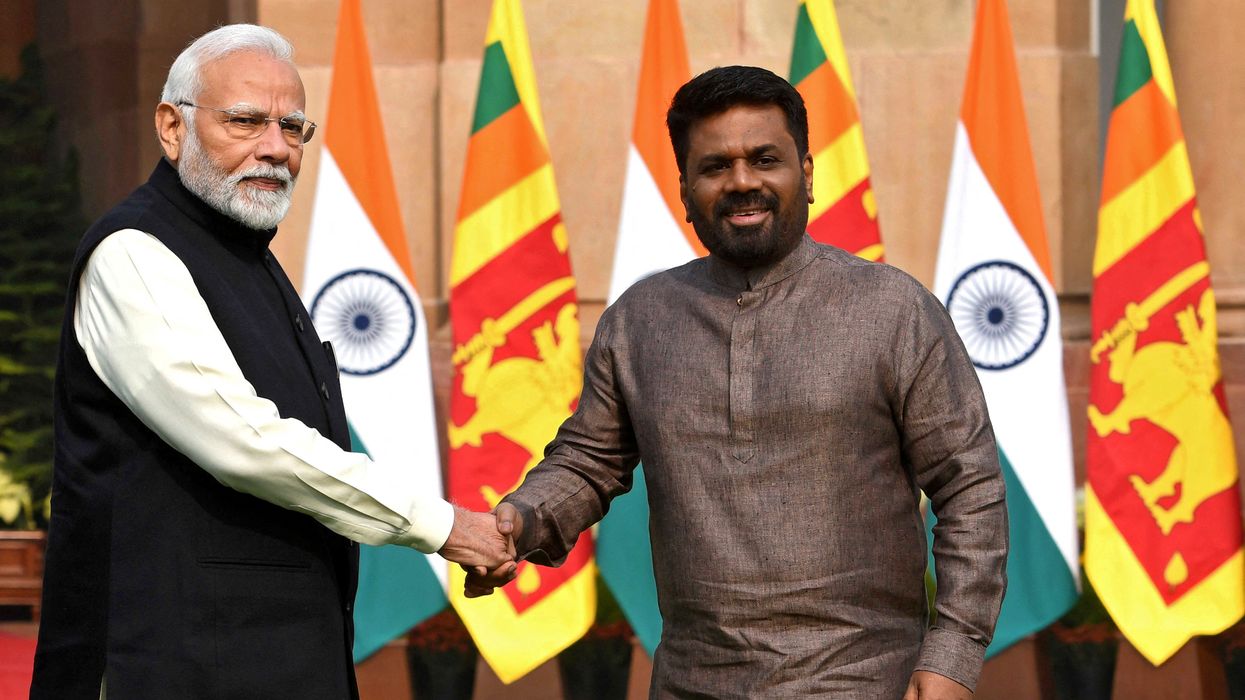INDIA plans to supply liquefied natural gas to Sri Lanka's power plants and will work on connecting the power grids of the two countries as well as lay a petroleum pipeline between the neighbours, India’s prime minister Narendra Modi said on Monday (16).
Modi was speaking at a joint press briefing with Sri Lanka’s president, Anura Kumara Dissanayake, in New Delhi.
Dissanayake was on his first official visit to India after winning the presidency in September and securing a landslide parliamentary election victory last month.
Indian state-run firm Petronet has signed a deal to supply liquefied natural gas to Sri Lankan engineering firm LTL Holdings' power plants in Colombo for five years through its terminal in the southern Indian city of Kochi.
Both sides also discussed a plan to connect power grids and lay a multi-product petroleum pipeline between the two countries, a joint statement from India’s External Affairs Ministry said.Dissanayake said he had held "productive discussions" with India's finance and foreign ministers, as well as national security adviser Ajit Doval.
"Our conversations focused on strengthening Indo-Sri Lanka economic cooperation, enhancing investment opportunities, fostering regional security, and advancing key sectors such as tourism and energy," Dissanayake said in a statement.\
"These engagements reaffirm the commitment to deepening the partnership between our two nations."
New Delhi has been concerned about Beijing's growing hold in Sri Lanka.
India has stepped up infrastructure projects in Sri Lanka in recent years, but China is Sri Lanka's largest bilateral lender.
India and Sri Lanka also agreed to jointly develop offshore wind power potential in the Palk Straits, an area where India's Adani Green Energy Ltd already has plans to invest $442 million in two wind power stations.
Sri Lanka is reviewing the wind power project along with a $553 million terminal project at the Colombo port also linked to Adani Ports. India’s foreign secretary said there was no reference to Adani’s involvement in the Colombo project during the meeting between Modi and Dissanayake.
Sri Lanka’s ports minister, Bimal Ratnayake, said last week the allegations against Adani had no bearing on the Colombo deep-sea container terminal project.
"The problem between Adani and the US... is not our concern," he told reporters during a tour of the port last Thursday (12) night. "It is of high importance for us that western container terminal development by Adani goes ahead."
Ratnayake said the project was necessary to generate revenue for the ailing Sri Lankan economy, still teetering after an unprecedented crisis and foreign debt default in 2022.
The port project has an estimated cost of $700 million and is located next to a similar Chinese-run facility.
Sri Lanka sits astride the world's busiest shipping route, which links the Middle East and East Asia, giving its maritime assets strategic importance.
Ratnayake's comments came days after Adani Group withdrew its request for a US government-backed loan of $553 million in the wake of the New York indictment.
The loan agreement with the US International Development Finance Corporation (DFC) was finalised last year.
Adani Group has said it will now finance the project from its own coffers.
Last month, US authorities accused Adani Group chairman Gautam Adani and seven others of being part of a $265 million scheme to bribe Indian officials, and of misleading US investors while raising funds there. The ports-to-power conglomerate has termed the allegations "baseless" and said it would seek "all possible legal recourse".
Dissanayake campaigned against the Adani wind project before his landslide election win in November, and Ratnayake said his government remained opposed to it.
"It would be disadvantageous to the country," Ratnayake added.
Dissanayake had dubbed the project a threat to Sri Lanka's energy sovereignty.
India extended more than $4 billion in aid to Sri Lanka when the island nation's economy plunged into a severe financial crisis in 2022 and entered into a preliminary debt restructuring agreement, along with other bilateral creditors Japan and China, in July.
The two countries will now finalise discussions on the bilateral memorandum of understanding needed to complete the debt restructuring process, the joint statement added.
Dissanayake is expected to travel to Beijing for talks with Chinese leaders in early 2025.
(Agencies)




